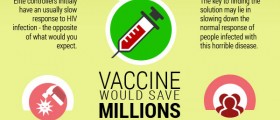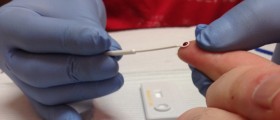The stress caused by possible HIV infection.
A lot of individuals fear being infected by HIV and take the necessary precautions such as using condoms and having them and their partners tested for the virus. There are situations, though, that are out of our control such as condoms breaking and this can cause a stressful situation.
HIV symptoms and signs would only present themselves around 6-12 weeks after the exposure. This is because it takes so long for the virus to replicate in your immune cells (CD4) and thereafter result in an immune response by the body.

The reason why one may experience flu-like symptoms within a week or two after possible HIV exposure is because one stresses and worries that they may have contracted HIV and this causes a stress response in the body. The adrenal glands start to produce adrenaline which results in cortisol being produced which, in turn, negatively affects the immune system. There may also be the possibility that you have contracted a common viral infection such as influenza or less common viral infections such as EBV (Epstein-Barr virus) or CMV (cytomegalovirus).
READ Being HIV Positive: Effects On Body, Treatment With Anti-retrovirals And Negative Stigma
Symptoms and signs of HIV
An individual infected with HIV may experience the following signs and symptoms which may last up to a few weeks:
- Fever.
- Sore throat.
- Muscle aches and pains.
- Headache.
- Generalized rash on the body.
- Swollen lymph nodes/glands, especially in the neck.
- Fatigue.
- Weight loss.
- Diarrhea.
- Generalized swollen lymph nodes, such as in the armpits (axillae) and in the groin area.
- Oral thrush caused by a fungal infection (candida).
- Shingles, which is a blister-like rash caused by the same virus which results in chickenpox in children (herpes zoster).
- Photo courtesy of SteadyHealth















